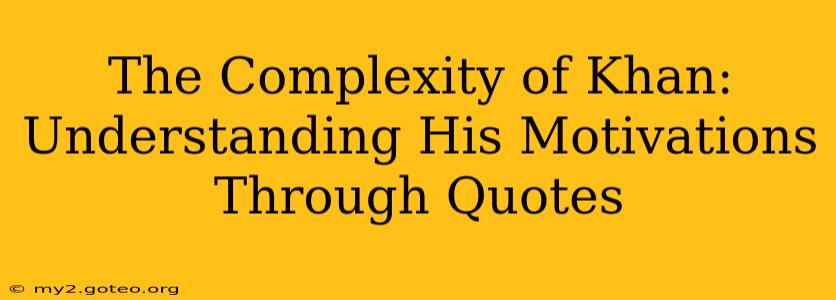Genghis Khan, the founder and first Great Khan of the Mongol Empire, remains one of history's most enigmatic and influential figures. His legacy is a complex tapestry woven from threads of brutal conquest and visionary leadership, leaving historians and scholars debating his motivations for centuries. While definitive answers remain elusive, examining his attributed quotes offers a fascinating glimpse into the mind of this remarkable, and often ruthless, leader. This exploration delves into the complexities of Khan's character, utilizing his words to illuminate his ambitions, strategies, and ultimate goals.
What were Genghis Khan's main goals?
Genghis Khan's primary goal was undeniably the unification of the Mongol tribes and the creation of a vast, powerful empire. This ambition wasn't merely territorial; it stemmed from a deep-seated desire for order and stability within a previously fragmented and warring society. His quotes reflect this: "Conquest is the beginning of all things," illustrates his belief in forceful unification as a necessary precursor to progress. He aimed to establish a system where the disparate Mongol tribes, long engaged in internecine conflict, could work together for a common purpose, ultimately achieving a level of unprecedented strength and influence on the world stage. This unifying goal transcended simple territorial expansion; it was about forging a new identity for the Mongol people.
Was Genghis Khan a cruel and merciless leader?
Undeniably, Genghis Khan was responsible for immense bloodshed and destruction. However, reducing him solely to a "cruel and merciless" label is an oversimplification. His ruthlessness was often a strategic tool, used to subdue enemies and consolidate power. His quote, "The greatest happiness is to scatter your enemy, to drive him before you, to see his cities reduced to ashes, to see those who love him shrouded in tears, and to gather into your bosom his wives and daughters," while undeniably brutal, reveals a calculated pragmatism. This wasn't senseless cruelty; it was a chillingly effective strategy to instill fear and prevent future rebellion. It’s crucial to understand the historical context of warfare at the time, where such tactics, while horrific, were unfortunately common. However, it's equally important to acknowledge the immense suffering caused by his actions.
How did Genghis Khan motivate his soldiers?
Khan’s leadership was characterized by a combination of fear and inspiration. He understood the power of shared purpose and loyalty. His quotes often emphasized the importance of discipline, honor, and unwavering commitment to the cause. He fostered a strong sense of camaraderie among his troops, creating a powerful fighting force driven by both fear of punishment and the desire for reward. For example, stories and possibly even quotes about the rewards of loyalty and the consequences of betrayal, although not directly attributable, portray his methods of motivation. He inspired loyalty through his actions, demonstrating courage and resilience in the face of adversity. His military successes instilled a strong sense of pride and confidence in his army, further motivating them to follow his command.
What was Genghis Khan's vision for the future?
Genghis Khan’s vision extended far beyond mere conquest. While his methods were often brutal, his ultimate goal was to create a stable and prosperous empire. Although hard evidence is limited, it can be inferred from his organization of the empire and his implementation of legal codes (like the Yassa) that he sought to create a functioning society, not just a conquered territory. This vision involved the establishment of trade routes, the protection of travelers, and the implementation of a unified legal system. While the cruelty cannot be overlooked, the creation of the Pax Mongolica—a period of relative peace and prosperity under Mongol rule—suggests a broader ambition than simply territorial domination. This period saw significant advancements in trade and cultural exchange along the Silk Road, indicating a deeper strategic thinking than simply conquest for its own sake.
Did Genghis Khan believe in a higher power?
While there's limited direct evidence concerning Genghis Khan's personal religious beliefs, his actions and policies suggest a pragmatic approach. He tolerated and even utilized different religions within his empire, demonstrating a political pragmatism rather than a fervent adherence to any specific faith. He valued practicality and efficiency above all else.
In conclusion, understanding Genghis Khan requires a nuanced approach. His quotes offer fragmented glimpses into a mind capable of both unimaginable cruelty and shrewd strategic planning. His legacy remains a subject of ongoing debate, highlighting the enduring complexity of a man who shaped the course of history. By examining these quotes within their historical context, we can begin to unravel the intricate motivations of this extraordinary figure.

